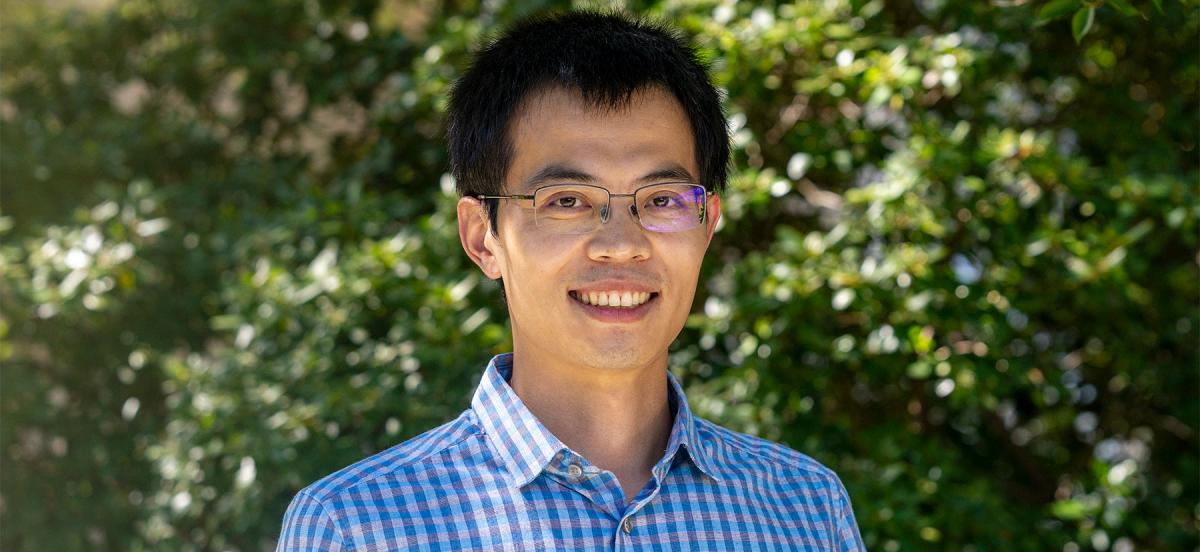Welcoming New Faculty: Foen Peng

The new assistant professor of biology studies "what genes make each flower special." Photo by Patrick Montero.
Details
Learn more about the new assistant professor of biology.
Foen Peng joins the Biology Department as an assistant professor. Peng grew up in rural mainland China and is a first-generation college student. He completed a B.S. degree in urban and rural planning and resource management in Shanghai. Peng later came to the United States and earned his Ph.D. at the University of Washington, where he studied evolutionary biology and plant genetics. He also initiated and co-led a diversity initiative working group in the University’s Biology Department that suggested changes for improving recruitment practices and providing better support for graduate students from underrepresented backgrounds. Prior to coming to Haverford, Peng was a postdoctoral fellow in genomics research at the University of Connecticut. His research is focused on understanding how multiple traits in plant species evolve coherently in response to a particular selective pressure.
What inspired him to seek a career in his field:
I grew up in the countryside of south China. Hills, rice paddies, and bamboo forests were my playground, and fish, frogs, and grasshoppers were my buddies. That childhood intimacy with nature sowed the seeds for my love of biology. In high school, I had the chance to get trained for the High School Biology Olympiad competition, and that training really exposed me to the wonderful world of biology. Although I did not choose biology as my major in college (because the teenage me thought I’d learned everything about it and should try something new), eventually I made a transition back after a few years of wandering in other fields.
About his research and what inspires him most about the work:
I am interested in the genetic basis of adaptation and speciation. Simply put, what genes make humans different from chimpanzees? But of course it is much harder to study this question in humans than in other organisms. As an alternative, I study what genes make each flower special. Flowers are pretty and attractive to humans, but they do not exhibit these traits to inspire our fondness. Rather, they are trying to attract animal pollinators to help them transport pollen to other flowers of the same species. Even closely related plant species can have very different flowers in color and shape, and they correspondingly attract different groups of pollinators, like bees and hummingbirds. Actually, that is often the reason why they are different plant species—the different animal pollinators drive them to differentiate and keep their pollen separate from each other. Knowing the gene identity after a long search can be very exciting and satisfying, but this only happens very occasionally. In general, understanding the tricks plants use to attract pollinators and sometimes manipulating those floral traits to assess pollinator's responses is a lot of fun.
A professor who particularly inspired him:
I have two. One is my high school Biology Olympiad Coach Li-Xin Chang. He was very eloquent and gave excellent impromptu speeches, which we all enjoyed listening to. He also liked to challenge us by asking thought-provoking questions, and pushing us to question the status quo of any knowledge—to think critically, and actively seek answers. The other is my Ph.D. advisor, Toby Bradshaw, at the University of Washington. He also liked to ask hard questions, and this made him intimidating to lots of graduate students. But I liked it. He made me think harder about a concept or an experiment and helped me avoid later troubles. He also had a deep love for the natural world and strongly encouraged me to explore it. A lot of Friday afternoons when we had our weekly meetings, along with talking about research, we often casually talked about where I could explore on weekends, fishing, hiking, traveling, etc. And we studied maps together, which are some of the best memories of my Ph.D. program. What I learned from both of these teachers is that the thought process is what really matters in learning—not the answer, not the grade.
What he’s passionate about outside of work:
I enjoy a lot of things outside of work. I like reading books and discussing them with friends. I like to travel and explore new places. I also like fine arts and ancient Chinese poems.
What’s on his must-watch list:
I don't watch a lot of movies, but The Bourne Identity is my favorite. In terms of books, my all-time favorite is a Chinese [satirical novel] called Fortress Besieged.



